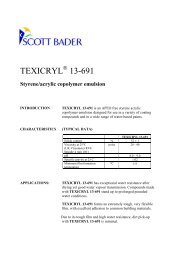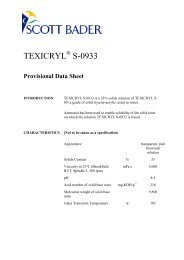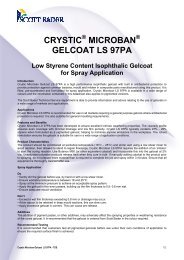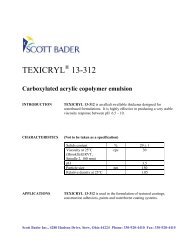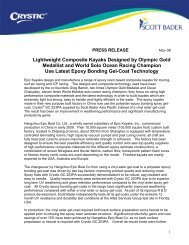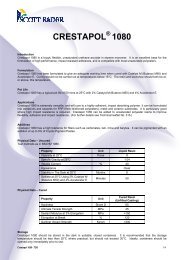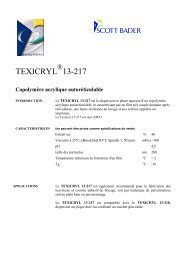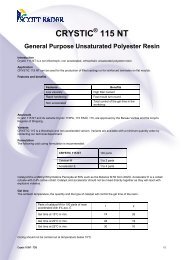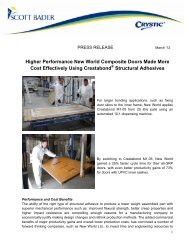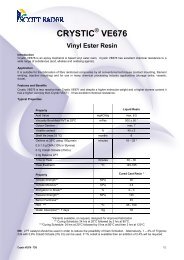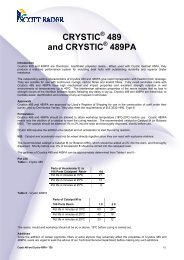Crystic 199 Resin - English - Scott Bader
Crystic 199 Resin - English - Scott Bader
Crystic 199 Resin - English - Scott Bader
- No tags were found...
Create successful ePaper yourself
Turn your PDF publications into a flip-book with our unique Google optimized e-Paper software.
CRYSTIC ® <strong>199</strong><br />
Introduction<br />
<strong>Crystic</strong><strong>199</strong> is an isophthalic polyester resin. It is recommended for use in high performance applications, such as the<br />
aircraft industry, where superior thermal and electrical properties are required. Fully cured laminates made with <strong>Crystic</strong><br />
<strong>199</strong> have excellent chemical and heat resistance. They can withstand long periods (1 year) at temperatures up to<br />
150ºC, and shorter periods at temperatures up to 200ºC, with no serious loss of properties.<br />
Formulation<br />
<strong>Crystic</strong><strong>199</strong> can be used in both hot and cold curing formulations.<br />
Hot Curing<br />
The recommended catalyst is Perkadox CH50X (or equivalent) which should be added at 2 % into the resin. The<br />
catalyst must be thoroughly dispersed into the resin, and the catalysed mix will remain usable for approximately 6 days at<br />
workshop temperature (18ºC - 20ºC). Cure will take place at temperatures between 80 ºC and 130 ºC, but for most<br />
applications 120 ºC will be satisfactory. For optimum heat resistant properties, the laminate should be cured at a<br />
temperature of 80 ºC – 100 ºC for half an hour to one hour, and then post cured.<br />
Cold Curing<br />
<strong>Crystic</strong> <strong>199</strong> should be allowed to attain workshop temperature (18ºC-20ºC) before use. It requires the addition of a<br />
catalyst and an accelerator to start the curing reaction.<br />
N.B. Catalyst and accelerator must not be mixed directly together, as they can react with explosive violence.<br />
The recommended catalyst is Butanox M50 (or equivalent) which should be added at 2 % into the resin. The catalyst<br />
must be thoroughly dispersed into the resin and this mix will remain usable for approximately 8 hours at workshop<br />
temperature (18 ºC – 20 ºC). Shortly before use, the correct amount of Accelerator E should be stirred into the catalysed<br />
resin. The amount of Accelerator E can be approximately determined from the table overleaf.<br />
Pot Life<br />
Parts of Accelerator E to<br />
100 parts of Catalysed <strong>Resin</strong> 1.0 2.0 3.0 4.0<br />
Pot life in minutes at 20ºC 70 52 38 30<br />
The resin, mould and workshop should be at, or above, 15 ºC before curing is carried out.<br />
Additives<br />
For use on large vertical or inclined surfaces, up to 20 % of <strong>Crystic</strong> Pregel 27 may be added to <strong>Crystic</strong> <strong>199</strong> to give it<br />
thixotropic properties. Fillers and pigments can adversely affect the heat, chemical and weather resistance of <strong>Crystic</strong><br />
<strong>199</strong>, so should not be used if optimum properties are required. Customers should satisfy themselves that any additions<br />
made will give the performance required.<br />
Post Curing - Hot Cured Laminates<br />
The post curing temperature will depend on the temperature which the laminate is to withstand. It should be increased in<br />
increments of 20 ºC to the final operating temperature, with a minimum of five hours post curing time at each 20 ºC<br />
increase.<br />
Post Curing - Cold Cured Laminates<br />
For optimum heat resistant properties, the laminate should be cured for seven days at workshop temperature (18 ºC – 20<br />
ºC). The post curing temperature should be increased in increments of 20 ºC, to that which the laminate is to withstand.<br />
A minimum of five hours post curing time should be given at each 20 ºC increase.<br />
<strong>Crystic</strong> <strong>199</strong>- TDS 1/3
Typical Properties<br />
The following tables give typical properties of <strong>Crystic</strong> <strong>199</strong> when tested in accordance with BS 2782.<br />
Property<br />
Liquid <strong>Resin</strong><br />
Appearance<br />
Clear, yellowish-brown<br />
Viscosity at 25ºC 37.35 sec -1 poise 6<br />
Specific Gravity at 25 ºC 1.10<br />
Volatile Content % 37<br />
Acid Value mg KOH/g 27<br />
Stability at 20 ºC months 6<br />
Geltime at 25 ºC using:<br />
minutes 16<br />
2 % Butanox M50, 4 % Accelerator E<br />
Property<br />
Fully cured* <strong>Resin</strong><br />
(unfilled casting)<br />
Barcol Hardness (Model GYZJ 934-1) 48<br />
Water Absorption 24hrs at 23ºC mg 29<br />
Deflection Temperature under load † (1.80<br />
ºC 127<br />
MPa)<br />
Elongation at Break % 2.0<br />
Tensile Strength MPa 55<br />
Tensile Modulus MPa 3300<br />
Specific Gravity at 25ºC 1.19<br />
Refractive Index n 20/d 1.554<br />
Dielectric Loss (tan δ at 1000Hz) 0.005<br />
Dielectric Constant (at 1000Hz) 3.1<br />
* Curing schedule - 24hrs at 20 ºC, 3hrs at 80 ºC<br />
† Curing schedule - 24hrs at 20 ºC, 5hrs at 80 ºC, 3hrs at 120 ºC<br />
Property<br />
CSM **Laminate<br />
Glass Content % 26.5<br />
Tensile Strength MPa 113<br />
Tensile Modulus MPa 5600<br />
Elongation at Break % 1.8<br />
Flexural Strength MPa 179<br />
Flexural Modulus MPa 5600<br />
** Made with 4 layers 450g/m 2 PB CSM.<br />
Curing schedule 24 hrs at 20 ºC, 16hrs at 40ºC<br />
<strong>Crystic</strong> <strong>199</strong> - TDS 2/3
Storage<br />
<strong>Crystic</strong> <strong>199</strong> should be stored in the dark in suitable closed containers. It is recommended that the storage temperature<br />
should be less than 20 ºC where practical, but should not exceed 30 ºC. Ideally, containers should be opened only<br />
immediately prior to use. Where they have to be stored outside, it is recommended that they are kept in a horizontal<br />
position to avoid the possible ingress of water.<br />
Packaging<br />
<strong>Crystic</strong> <strong>199</strong> is supplied in 25kg and 200kg containers. Bulk supplies can be delivered by road tanker.<br />
Health & Safety<br />
Please see separate Material Safety Data Sheet.<br />
Version 2 : February 2013<br />
All information on this data sheet is based on laboratory testing and is not intended for design purposes. <strong>Scott</strong> <strong>Bader</strong> makes no representations or warranties of any<br />
kind concerning this data. Due to variance of storage, handling and application of these materials, <strong>Scott</strong> <strong>Bader</strong> cannot accept liability for results obtained. The<br />
manufacture of materials is the subject of granted patents and patent applications; freedom to operate patented processes is not implied by this publication.<br />
SCOTT BADER COMPANY LIMITED<br />
Wollaston, Wellingborough, Northamptonshire, NN29 7RL<br />
Telephone: +44 (0) 1933 663100<br />
Facsimile: +44 (0) 1933 666623<br />
www.scottbader.com<br />
<strong>Crystic</strong> <strong>199</strong> - TDS 3/3




